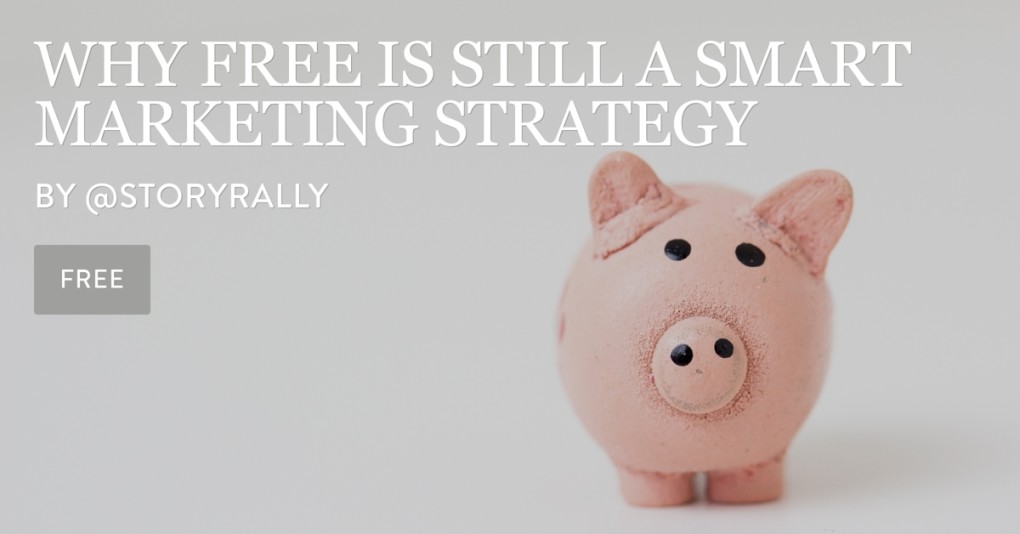by Jason Kong, @storyrally
If you’re wondering whether not charging for selected stories is benefiting your promotional campaign, you’re not alone.
With all the free writing flooding the internet, it’s harder to stand out. Even if someone downloads your free eBook, your fiction is competing with all the other stories on that person’s digital reader.
Given the ubiquity of free, it’s reasonable to question whether the market is saturated, thus reducing the effectiveness. I, on the other hand, believe free still works.
Let’s take a closer look on why that is.
How fiction authors hook new readers
Many marketing options revolves around elevating interest. Some simple examples: a compelling description of your story or an attractive book cover.
Positive word-of-mouth is particularly effective in this respect. That’s why online book reviews are so useful. Or how a recommendation from a friend gets you to check out a novel you’ve never heard of before.
But one of the most powerful forms of marketing is allowing people to try the product themselves, and letting them draw their own conclusions. If they’re happy with the sample, they’ll be more inclined towards other offerings under the same brand.
And that’s the true value of sharing some of your fiction writing for free. It allows you to accelerate the process of connecting your stories with the readers that want them.
Because people believe their own experiences above all.
If free is such a smart idea, then why doesn’t it work better?
The reason could be your implementation of the tactic. For example:
- Instead of asking for a review or plugging your other stories in your free eBook, why not incentivize readers to sign up for your email newsletter? Keeping in touch and building trust over time is a great way to grow a loyal readership.
- Instead of just waiting for people to find your free story, why not target the kind of readers that would enjoy it? Using Facebook Ads, for instance, gives you the ability to specify characteristics of the recipients that see your advertising.
Over to you
Have you found free to be an effective marketing strategy in promoting your fiction writing? Why or why not?
Jason Kong is the founder of Storyrally, a free email-based subscription that helps fiction writers with their online marketing. Sign up now and receive the guide “How to Use Testimonials to Hook New Readers.”
Why Free is Still a Smart Marketing Strategy for Fiction Writers ( from @storyrally ): Click To Tweet


I’m in a couple free anthologies, but none of my books are free. I suppose I could write a story that ties in with my series and offer it for free.
Alex: You’ve described a smart way to leverage a free story, and having that intention before you start writing your free fiction will help make that process easier.
And free works best when you have something else for readers to purchase.
Diane: Absolutely. When done right, a free story can be an effective gateway to an author’s body of work.
I’m writing in series where the first book is free. It’s a risk-free way for folks to try out the series and see if they want to keep going with it. When I’m curious about an author, I’m far more likely to try them out if I can get a book for free. I think of it as the same principle as a library. I get hooked on authors when reading for free, then buy their new books at launch.
Kessie: I’m curious. In your case, where are you choosing to direct people after they read your free offering? Are you linking to the next book in your series, asking for a review, or possibly trying to get them to subscribe to your email newsletter What is working for you?
This is a really useful perspective on a question I think a lot of authors have. Deciding whether, and to what extent, to offer one’s work for free isn’t easy, for obvious reasons. You’ve made an interesting argument in support of the freebie, though. Thanks.
Margot: Thanks for the comment. Every author’s situation is different, so of course saying that everyone should use free is a reach.
We’re way past the point of where the concept of free is remarkable, however, and I thought it would be useful to discuss why the approach still makes sense if a fiction writer is going to do it.
I think you make an excellent point–instead of hoping your one free piece will tempt them enough to go buy all your stuff, you use the one piece to open up a long-term door. Now I just need to convince myself to make a mailing list. I’ve been a big baby about that.
Hart: Maintaining a mailing list may sound intimidating if you see it as producing a monthly newsletter that’s nicely formatted with tons of content. But it can also be infrequent updates in a basic email format too.
Once you have a way for readers to subscribe so they can hear from you, that’s a big step you’ve taken. Everything else is about making it better and you can make your improvements over time.
Great observations. I haven’t pubbed yet, but I’m planning on having several books ready so I can set up one for free and have others ready to go for readers who enjoy! :)
Jemi: Sounds great. Best of luck!
One of the many questions indie writers must answer for themselves. I think a mailing list is a good idea. I’m just not sure what kind of content I’ll need to send out a newsletter. Thanks.
Keep in mind that having a mailing list does not obligate you to using a newsletter format (i.e. set schedule, consistent format, etc.). Some authors choose to only email when they have something to say, in a tone and style like you’re getting a message from friend.
As far as content goes, there are many options. You could share the progress of upcoming books. Or divulge the research that went into previous stories. Some writers even recommend other authors with books that would appeal to the same readership. Subscribe to the mailing list of a few authors to get ideas.
The most important thing, I think, is this: the people on your email list subscribed with a certain expectation. You have the rare and valuable gift of attention, at least for a little while. What will you do with it?
[…] Why Free is Still a Smart Marketing Strategy for Fiction Writers – Elizabeth Spann Craig […]